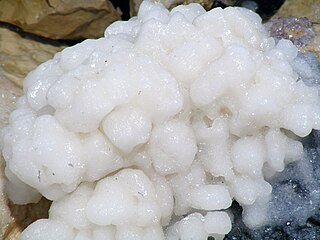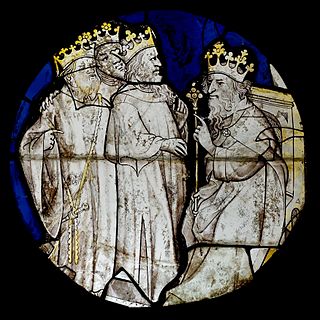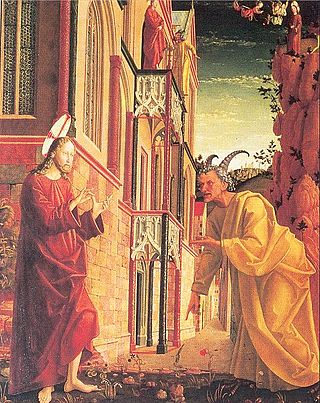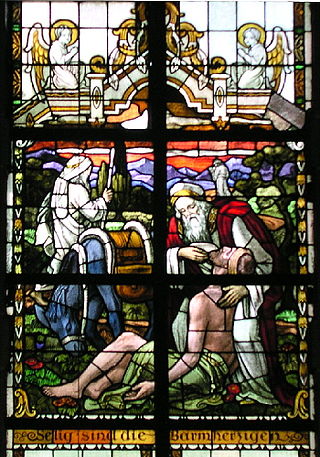
Matthew 5:13 is the thirteenth verse of the fifth chapter of the Gospel of Matthew in the New Testament. It is part of the Sermon on the Mount, the first of a series of metaphors immediately following the Beatitudes.

Matthew 2:2 is the second verse of the second chapter of the Gospel of Matthew in the New Testament. The magi travelling from the east have arrived at the court of King Herod in Jerusalem and in this verse inform him of their purpose.

Matthew 2:3 is the third verse of the second chapter of the Gospel of Matthew in the New Testament. In the previous verse the magi had informed King Herod that they had seen portents showing the birth of the King of the Jews. In this verse he reacts to this news.

Matthew 2:4 is the fourth verse of the second chapter of the Gospel of Matthew in the New Testament. The magi have informed King Herod that they had seen portents showing the birth of the King of the Jews. In this verse he calls together leading figures of Jerusalem to find out where Jesus was to be born.

Matthew 2:7 is the seventh verse of the second chapter of the Gospel of Matthew in the New Testament. The magi have informed King Herod that they had seen portents showing the birth of the King of the Jews. Herod has consulted with the leading Jewish religious figures who reported he was to be born in Bethlehem. In this verse Herod again questions the magi.

Matthew 2:9 is the ninth verse of the second chapter of the Gospel of Matthew in the New Testament. King Herod has dispatched the magi to Bethlehem to find the infant Jesus. In this verse they follow the Star of Bethlehem to find the infant.

Matthew 2:11 is the eleventh verse of the second chapter of the Gospel of Matthew in the New Testament. The magi, dispatched by King Herod, have found the small child Jesus and in this verse present him with gifts in an event known as the Visit of the Wise Men. In art, is traditionally referred to as the Adoration of the Magi.

Matthew 2:20 and 2:21 are the twentieth and twenty first verses of the second chapter of the Gospel of Matthew in the New Testament. The young Jesus and the Holy Family are in Egypt. An angel has just informed Joseph that King Herod, his persecutor, is dead. In this verse the angel gives him further instructions. The wording of this verse is extremely close to that of Exodus 4:19.

Matthew 3:3 is the third verse of the third chapter of the Gospel of Matthew in the New Testament. The verse occurs in the section introducing John the Baptist, and links him to messianic prophecies.

Matthew 3:16 is the sixteenth verse of the third chapter of the Gospel of Matthew in the New Testament. Jesus has just been baptized by John the Baptist and the Holy Spirit comes to him like a dove.

Matthew 4:2 is the second verse of the fourth chapter of the Gospel of Matthew in the New Testament. This verse is just preceding the section in Matthew dealing with the temptation of Christ by Satan. Jesus has been led out into the wilderness, and in this verse he fasts.

Matthew 4:5 is the fifth verse of the fourth chapter of the Gospel of Matthew in the New Testament. Jesus has just rebuffed Satan's first temptation, and in this verse the devil transports him to the site of the second temptation.

Matthew 4:13 is the thirteenth verse of the fourth chapter of the Gospel of Matthew in the New Testament. In the previous verse, Jesus returned to Galilee after hearing of the arrest of John the Baptist. In this verse, he leaves from Nazareth to Capernaum.

Matthew 4:24 is the twenty-fourth verse of the fourth chapter of the Gospel of Matthew in the New Testament. This verse is part of a brief summary of and introduction to Jesus' ministry in Galilee, which will be recounted in the next several chapters. This verse relates Jesus' fame "throughout all Syria" and summarizes his work of healing.

Matthew 5:1 and Matthew 5:2 are the first two verses of the fifth chapter of the Gospel of Matthew in the New Testament. The verses introduce the Sermon on the Mount that will be recited in the next several chapters. The previous chapter concluded with large crowds "from Galilee, and from the Decapolis, Jerusalem, Judea, and beyond the Jordan" who followed Jesus to witness him healing: these verses present Jesus as seeing the crowds and going up onto a mountain to begin teaching.

Matthew 5:4 is the fourth verse of the fifth chapter of the Gospel of Matthew in the New Testament. It is the second verse of the Sermon on the Mount, and the second of what are known as the Beatitudes.

Matthew 5:7 is the seventh verse of the fifth chapter of the Gospel of Matthew in the New Testament. It is the fifth verse of the Sermon on the Mount, and also the fifth of what are known as the Beatitudes.

Matthew 5:12 is the twelfth verse of the fifth chapter of the Gospel of Matthew in the New Testament. It is the tenth verse of the Sermon on the Mount. This verse is generally seen as part of an expansion of the eight Beatitude, others see it as the second half of the ninth Beatitude, a small group feel it is the tenth Beatitude and thus brings to a close a second Decalogue.

Matthew 5:31 is the thirty-first verse of the fifth chapter of the Gospel of Matthew in the New Testament and is part of the Sermon on the Mount. This verse opens the brief, but much scrutinized, discussion of the issue of divorce.

Matthew 10:1 is the first verse of the tenth chapter of the Gospel of Matthew in the New Testament. In this verse Jesus gathers his disciples and grants them healing powers in what is known as the commissioning the twelve apostles.




















